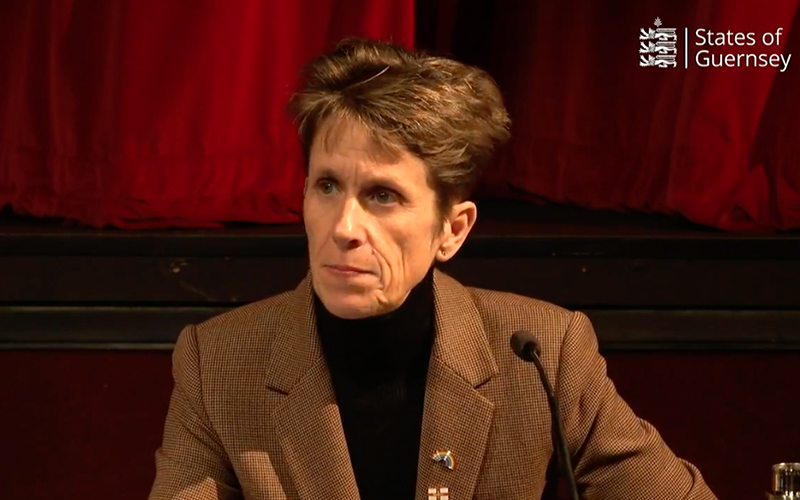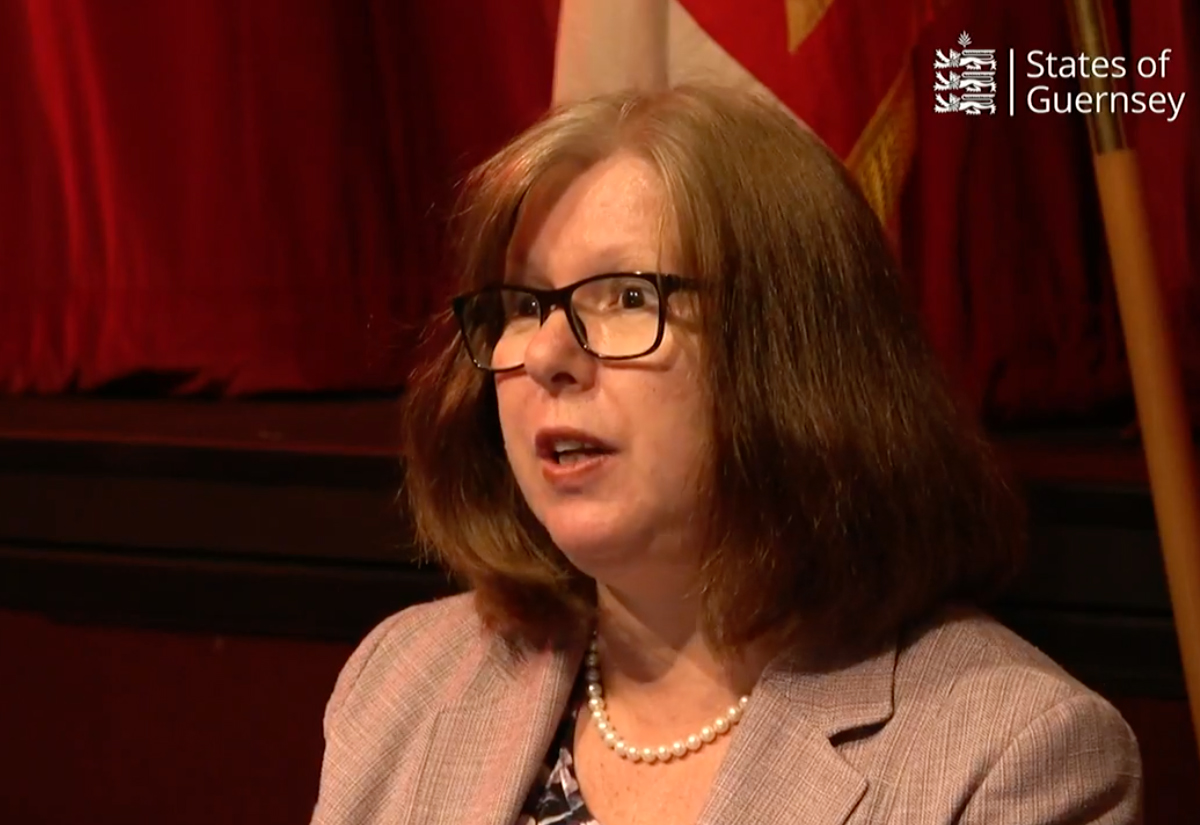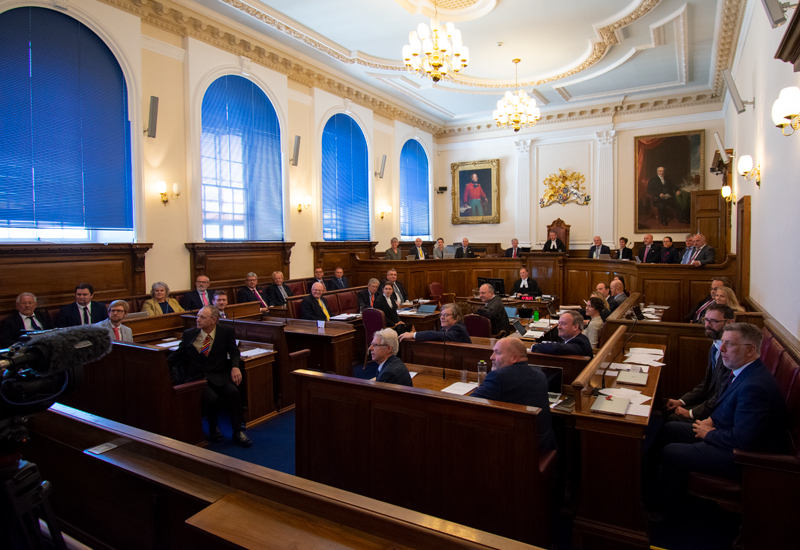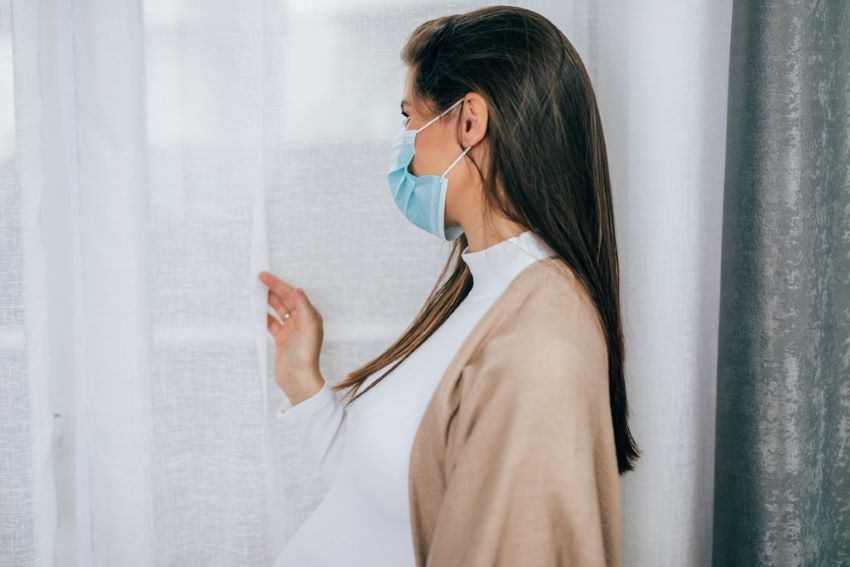


Proposals about the future management of the covid-19 pandemic face extensive opposition when they are debated by the States next week.
Under the proposals, the Civil Contingencies Authority would continue to use emergency regulations to manage covid-19 for the time being while legislation is drawn up to transfer many of its powers to the Medical Officer of Health – including powers to impose isolation and other restrictions on people infected or suspected of being infected with the virus.
But the plans put forward by three States’ Committees – Policy & Resources, Health & Social Care, and Home Affairs – face opposition from members on two of those Committees and other deputies.
Deputy Tina Bury, Vice-President of the Committee for Health & Social Care, said the proposals going to the States “offer no real alternative to the current situation and therefore don't address the concerns aired by some in the community and some members of the Assembly”.
Deputy Aidan Matthews, who is also a member of the Committee for Health & Social Care, said “the pandemic is entering its third year and we have no end in sight…we should be able to do better than rely on emergency powers indefinitely”.
Deputy Andrew Taylor, a member of the Committee for Home Affairs, said “there was some consultation” with members of the Committees putting forward the proposals “but it felt more like being taken along for the ride”.
The members who dissent from their own Committees’ proposals have the support of several other deputies. Two experienced States’ members – Deputies Gavin St. Pier and Peter Roffey – said the proposals lack adequate checks and balances on decisions to constrain islanders’ freedom of movement.
The proposals can be read in full HERE.

Pictured: If the States agree to proposals about how the pandemic should be managed in the future, many of the responsibilities of the Civil Contingencies Authority will be transferred to the Committee for Health & Social Care and the Medical Officer of Health.
The Civil Contingencies Authority has sweeping powers to make emergency regulations or to empower others to make emergency regulations without the involvement of the States’ Assembly. However, such regulations must be approved by the States’ Assembly within seven days and can remain in place for a maximum of 30 days.
The three Committees are asking the States’ Assembly to look ahead to a time when emergency regulations may no longer be required. In particular, they are asking the States to back two proposals for the ongoing management of the pandemic and any future pandemics.
Their first proposal – for the ongoing management of the current pandemic – would extend public health legislation dating back to 1936 to give the Medical Officer of Health powers to impose isolation and other restrictions on people infected or suspected of being infected with covid-19.
Their second proposal – for the management of future pandemics – would allow the Committee for Health & Social Care to make orders for the Medical Officer of Health’s new powers to be extended to other diseases.
Deputy Heidi Soulsby, Vice-President of the Policy & Resources Committee, said the proposals allow “an important debate for our Assembly to have…it’s right that all members can openly discuss the right way for our community now to handle this ongoing pandemic”.

Pictured: Deputy Heidi Soulsby has said that the Bailiwick's response to covid-19 has been "balanced and proportionate" and she believes the proposals going to the States next week would allow that approach to continue.
Deputy Rob Prow, President of the Committee for Home Affairs, said the States’ debate will “add to the democratic scrutiny that must continue to form part of our governance even where we are dealing with this ongoing emergency”.
Deputy Al Brouard, President of the Committee for Health & Social Care, acknowledged that “there are a real mix of views” on the proposals and said he was “look[ing] forward to discussing those fully and openly with all members”.
His Vice-President, Deputy Bury, said her opposition is “to the overall content of the policy letter and the absence of any propositions relating to the powers and continuing operation of the Civil Contingencies Authority”.
“I was under the impression that when this policy letter was brought forward it would facilitate debate and decision making around the continuing powers of the Civil Contingencies Authority, taking into account whether we would consider ourselves still being in a state of emergency and with a view to deciding how we manage covid going forward,” said Deputy Bury.
“However, this policy letter, bar proposing to shift some powers to the Medical Officer of Health, only facilitates a discussion, not any real decisions by the Assembly.
“The policy letter explains the one option that was considered as an alternative and then explains how it was decided that option was not deemed appropriate. It does not show that any other alternatives were explored and the lack of propositions relating to this removes the decision-making process from members of the Assembly. The decision to continue as is has essentially already been made within the policy letter.”
Deputy Bury said that transferring powers from the Civil Contingencies Authority to the Medical Officer of Health “could be seen as adding to a democratic deficit rather than improving it”.
“This is no reflection of the individual concerned, but I think it is important to remember that these powers are given to whoever is in that role and that may not always be the person it is currently,” she said.

Pictured: Deputies with concerns about the proposals going to the States next week speak highly of the work led by the Bailiwick's Medical Officer of Health, Dr Nicola Brink, in dealing with the pandemic locally, but they are concerned about putting additional extensive powers in the hands of a statutory official with what they consider inadequate checks and balances.
Deputy Taylor said he became increasingly concerned as the proposals went through various drafts.
“Initially, we were even looking at an option of a new committee to replace the Civil Contingencies Authority. But, in the background, there was this idea of permanently embedding the Authority’s regulations in public health regulations,” said Deputy Taylor.
“We’ve ended up with a proposal for the Committee for Health & Social Care to go away and consider options. But the ideas they come back with will be based on advice from the Medical Officer of Health and so they are likely to be the same as in the previous drafts we saw – based on the emergency regulations of the Civil Contingencies Authority.
“One argument was that it has been like this for 18 months and no-one has really objected.
“Having had a few questions during the process, I don’t feel they have really been answered.
“I was quite pleased to see that Deputies Bury and Matthews have concerns as well. I’m not standing completely alone in this. I’m glad it’s now out in the open and people can discuss it.”
Deputy Matthews said he does not object to the single proposition on which the States will vote next week because “moving powers from the Civil Contingencies Authority to the Committee for Health & Social Care is a positive move for transparency and accountability”. But he thinks “the policy letter is incomplete – it does not replace the need for the Civil Contingencies Authority or use of emergency powers”.
“My general view is that the use of emergency powers is not ideal,” said Deputy Matthews. “It concentrates the response to a limited number of politicians and doesn’t provide a high level of democratic oversight.

Pictured: Deputies from across the political spectrum have spoken of their concerns about the possibility of the States' Assembly being marginalised in future decisions about managing covid-19 if proposals from three States' Committees are approved next week.
“To maintain the public’s confidence and trust in the measures, we must be able to demonstrate decisions have broad support from our elected representatives," said Deputy Matthews.
“Overall, our response has been professional and has met the objective of preventing serious illness successfully. We should acknowledge the hard work, dedication and expertise of the professionals advising the States, who have performed fantastically well. The Civil Contingencies Authority has a difficult task and I have full confidence all members have done their best to set a course that balances opposing views in the island.
“However, it has not all been plain sailing. Our border policy has suffered from missteps, such as the introduction and then removal of pre-departure testing. The financial impact of quarantine is difficult for some – the self-employed can be particularly hard hit [as well as] many essential workers and hospitality staff.”
Deputy Roffey said he has “deep concerns over proposals to give an unelected officer the power to determine who should be put under effective house arrest in Guernsey and in what circumstances”.

Pictured: Deputy Peter Roffey is among States' members who want to ensure appropriate political oversight of powers to require islanders to isolate away from the rest of the community.
“I do fully accept that there may well be circumstances – hopefully rare – when islanders will need to be forced to isolate in order to protect the wider community in the face of dangerous, infectious conditions. Such measures would need to be introduced very judicially and at all times those charged with making such decisions should bear clearly in mind the principle of proportionality. I also accept that the Medical Officer of Health, as the head of public health in Guernsey, is best placed to advise on such matters," said Deputy Roffey.
“Where I part company with the Committees behind this policy letter is over their suggestion that such drastic steps could be taken without any apparent political accountability. I think political accountability is absolutely crucial in these circumstances...that accountability appears to be absent.
“My suggestion is that any decision to oblige isolation, due to the dangers posed by an infectious disease, should be vested in the Committee for Health & Social Care and not in its officers. And such decisions should then be ratified, or otherwise, by the States’ Assembly as soon as practicable.
“Clearly, in making such decisions, the Committee for Health & Social Care would lean heavily on the advice of the Medical Officer of Health and other public health experts, but the final decision should lay with the politicians. As Mrs Thatcher once said: ‘advisors advise but ministers [or, in Guernsey, committees] decide’."

Pictured: Margaret Thatcher, Prime Minister between 1979 and 1990, said that in a democracy it was important that officials should advise governments but that key decisions should be made by elected politicians accountable to the public.
Deputy Roffey added: “Nothing in what I say should be read as showing any lack of confidence in the current Medical Officer of Health. It is simply a principle that in democracies far-reaching policy decisions, which limit the freedoms of their citizens, demand that accountability is taken by those elected by the public to assume such responsibilities.”
Deputy St. Pier said he had similar concerns bearing in mind that “we are talking about conferring powers which, when used, fundamentally impact individuals’ human rights and freedoms”.
“In essence, the proposal is to permanently embed in the 1936 Public Health legislation powers for the Medical Officer of Health to compel self-isolation for people in the Bailiwick for covid-related reasons. We have to keep in mind that whilst there may generally be a high degree of confidence in the current Medical Officer of Health, that has not always been the case in the 100-year history of the office,” said Deputy St. Pier.
“Interestingly, the policy letter notes that the Committee for Home Affairs felt strongly that if these powers were to be used widely – as opposed to at an individual level – that should be a political decision and not one for a single statutory official. I agree with them, but the proposition fails to address those concerns.
“The policy letter also claims there is general support for the proposals with, they say, appropriate safeguards and governance. But the policy letter is then silent as to any suggestions as to what the appropriate safeguards and governance could or should be.
“These powers are currently renewed every 30 days. While a case can be argued – as the policy letter does – for the likelihood of needing these powers for some time to come to manage covid, we cannot possibly know at this point that they will be permanently needed. It is not sufficient to say that if they are not needed they won’t be used.
“I think it is imperative that any powers are subject to periodic review and approval by the States of Deliberation. That is not unreasonable and is the least we can expect when we are talking about conferring powers which, when used, fundamentally impact individuals’ human rights and freedoms.”
Comments
Comments on this story express the views of the commentator only, not Bailiwick Publishing. We are unable to guarantee the accuracy of any of those comments.